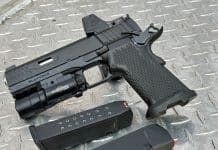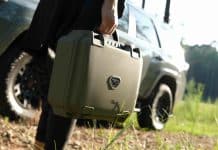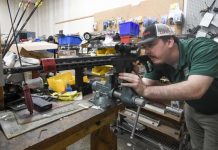
Like a car, there are parts of our lives that require an occasional service, replacement, or tune-up. With each new year comes the opportunity to conduct important annual maintenance to keep your gear, safety equipment, and skills in good working order. In this article, Doug shares an annual checklist which can be used to ensure things perform as expected when we need them the most.
I kiss my wife as the ball drops in Times Square, we toast to the new year, bang pots and pans out in the street, and we’ll all be asleep by 9:30pm. Yes, we like to pull the famous “West Coast New Year’s Maneuver” with our children… and for good reason! Sure, there is the “nothing good comes from young kids staying up until midnight” reason, and the “tomorrow morning the children won’t care that Daddy had a late night using his Tactical Bottle Breaching Device” reason too… but another important reason we hit the sack early is because New Year’s Day is a busy one for me.
In addition to whatever my wife has planned for me on my extra day off, I also have my annual checklist of things I do every year on January 1st.
Many years ago I started using New Year’s Day as the day I do my annual maintenance on things like my everyday carry gear, home safety equipment, and training plan. I chose this date because I typically have it off from work and haven’t historically felt like doing much of anything else after the previous night’s festivities. Even though my children won’t allow me to sleep until noon like I used to, I have maintained my other New Year’s tradition of doing my annual checklist on the first day of the year.
While this list is not exhaustive, it is my starting point each year to get me going. If you have things you do on an annual basis that aren’t included here, please leave them in the comments below so everyone can share in your ideas.
Changing Batteries: Once each year I change the batteries in all the important things I depend on throughout the year. I put a fresh battery in every smoke detector and carbon monoxide detector… and, if you haven’t already, this is a great time to install a smoke detector in your garage. Trust me, following a house fire, you’ll wish you had. I also put fresh batteries in all my lockboxes and safe.
Sure, chances are none of the batteries I replace that day actually need to be replaced, but I do it anyway because I want to be sure they’re at full-power. It’s kind of like a 9 volt tactical-reload. I take the old batteries, mark them as “used” and then save them to be put into the kids’ toys and such throughout the year.
Side note: check the date on your carbon monoxide detector. Most models instruct you to discard and replace it when it becomes 10 years old. If you have one that is getting close to or has passed the 10 year mark, replace it with a new one.
Check Fire Extinguishers: First off, do you have them in several places in your home and in all of your vehicles? If not, go get some new ones. A good rule of thumb is to place fire extinguishers throughout your house the same way you would your home protection equipment. In short, you never know when or where you’re going to be when you need one, so be sure to have them readily available.
Next, check the date for the last time they were serviced. The industry standard is to have them serviced annually for regular maintenance and to have them serviced immediately upon discharging the unit or if the pressure drops outside of the green area on the pressure gauge.
Chemlights: Ever had a “snap-shake-whaa?” instead of the “snap-shake-aah!” you expected? Order them in bulk and rotate them annually. Similar to what I do with the batteries, last year’s emergency chemlights become this year’s camping and Halloween chemlights. When the power goes out or you need to toss a handful of them to illuminate something, you need them to work. So get some fresh ones and let the kids help you dispose of last year’s.
Sharpen Your Blades: If you’re anything like me, your defensive folding knives also serve as your daily use knives and typically we don’t sharpen them as often as we should. While this is something which should be done much more than once each year, spend this time giving your blades some extra care and thoroughly clean and lube them while you’re at it.
Avoid Hot Pocket: OC spray is cheap to replace and there is nothing worse than having one start to leak in your pocket. I added this to the annual list a few years back after feeling like certain places of my body that I’d never want to be sprayed in were suddenly melting in a fiery inferno. Trust me – spend a few bucks and get a new can of OC. Take your old can out somewhere away from others and deploy it as a refresher on how it will perform when you need it.
This is a test… this is only a test.
Locks & Deadbolts: Check all your window locks, deadbolts, and security system if you have one to ensure they’re in good condition and are working properly. Be sure to lube your locks while inspecting them to improve function, increase their life, and reduce key wear. I use graphite or a tiny bit of gun oil depending on the lock. If anything is broken or only partially-functional, it’s time to replace it. Rekeying your house every few years isn’t a bad idea either. Perform a system test on your security system… but just be sure you ask your alarm company how to do it so they know that it’s you and not a real alarm. False alarms can be expensive.
Carry Gun & Ammo: The ammunition you have riding around in your carry gun(s) has probably been there a while. It’s been exposed to heat and cold, wet and dry, sweat, oils, detergents, perfumes, and all the things children manage to spill on us… and it’s probably still just fine and perfectly operational. Nevertheless, if there is one item that must work when all else fails, it’s your firearm. Purchase new carry-ammunition to replace the old and then go to the range to shoot last year’s ammo. This allows you to re-familiarize yourself with how that specific ammo is going to feel and perform because, if you’re like me, you typically train with range-ammo and not with what you actually carry for protection. Doing this also gives you a warm and fuzzy feeling knowing last year’s ammo was in good condition all the time you were carrying it.
Once done at the range, thoroughly inspect, clean and lube your firearm. Spend some extra time with it similar to what you’ll do with your knives. A full break-down and thorough cleaning will go a long way in extending the life of the weapon and maintaining the performance you expect from it.
Schedule Training: Put some time into yourself. Take advantage of the training deals around the new year and book some training for the coming months. Booking the training now puts it on your calendar and having it on the calendar is the key to making it happen. This also allows you to spend some time developing a plan of what area(s) you want to focus on. Whether pistols, rifles, knives, unarmed self defense, or tactics, having a plan will help you better accomplish your goal(s).
On behalf of the entire Guns & Tactics Team, we wish you a safe, healthy and happy new year!













Great reminders Doug! Thank you!
Comments are closed.